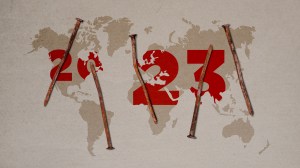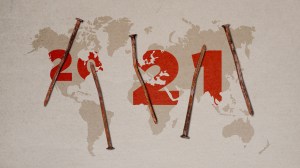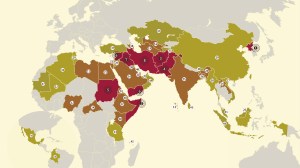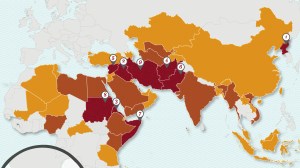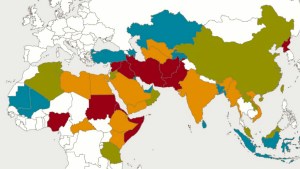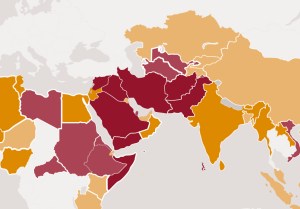In this series

Almost 5,000 Christians were killed for their faith last year. Almost 4,000 were abducted.
Nearly 15,000 churches were attacked or closed.
And more than 295,000 Christians were forcibly displaced from their homes because of their faith.
Sub-Saharan Africa—the epicenter of global Christianity—remains the epicenter of violence against followers of Jesus, according to the 2024 World Watch List (WWL). The latest annual accounting from Open Doors ranks the top 50 countries where it is most dangerous and difficult to be a Christian.
The concerning tallies of martyrdoms and abductions are actually lower than in last year’s report. But Open Doors emphasizes they are “absolute minimum” figures. It attributed both declines to a period of calm in advance of Nigeria’s last presidential election. Yet Nigeria joined China, India, Nicaragua, and Ethiopia as the countries driving the significant increase in attacks on churches.
Overall, 365 million Christians live in nations with high levels of persecution or discrimination. That’s 1 in 7 Christians worldwide, including 1 in 5 believers in Africa, 2 in 5 in Asia, and 1 in 16 in Latin America.
And for only the fourth time in three decades of tracking, all 50 nations scored high enough to register “very high” persecution levels on Open Doors’ matrix of more than 80 questions. So did 7 more nations that fell just outside the cutoff. Syria and Saudi Arabia, meanwhile, entered the tier of “extreme” persecution, raising its count to 13 nations.
The purpose of the annual WWL rankings is to guide prayers and to aim for more effective anger while showing persecuted believers that they are not forgotten.
The 2024 version tracks the time period from October 1, 2022, to September 30, 2023, and is compiled from grassroots reports by teams of Open Doors workers and partners across more than 60 countries. The methodology is audited by the International Institute for Religious Freedom.
When the list was first issued in 1993, only 40 countries scored sufficiently high to warrant tracking. This year, 78 countries qualified.
Where are Christians most persecuted today?
North Korea ranked No. 1, as it has every year except for 2022 when Afghanistan briefly displaced it. The rest of the top 10 reshuffled but remained the same: Somalia (No. 2), Libya (No. 3), Eritrea (No. 4), Yemen (No. 5), Nigeria (No. 6), Pakistan (No. 7), Sudan (No. 8), Iran (No. 9), and Afghanistan (No. 10).
The deadliest country for Christians was Nigeria, with more than 4,100 Christians killed for their faith—82 percent of the global tally. Overall, 15 sub-Saharan countries scored “extremely high” on Open Doors' violence metric. In Mali (No. 14) and Burkina Faso, jihadists exploited breakdowns in government security, while attacks on churches grew sharply in Ethiopia (No. 32).
Open Doors scores each nation on a 100-point scale. Increases of more than 4 points were recorded in Oman (4.2), Burkina Faso (4.8), Nicaragua (5.3), Algeria (6.1), and Laos (6.6). Oman rose from No. 47 to No. 31, though the specifics of its violence statistics are kept hidden for security reasons. In its second year on the list, Nicaragua rose from No. 50 to No. 30, due to open government hostility against the church. Algeria rose from No. 19 to No. 15, as authorities stepped up a campaign against the Protestant church, of which only 4 of 46 churches remain open.
Laos, however, which rose from No. 31 to No. 21, was cited as a good news story.
“I never saw a clearer connection of a growing church with growing opposition, resulting in higher scores,” said an Open Doors researcher “I find it comforting that the biblical verses predicting this connection are still true.”
Colombia was the only nation in the top 50 to record a decrease of at least 2 points (2.5), dropping from No. 22 to No. 34. Significant improvement was seen also in Vietnam (dropping from No. 25 to No. 35), Indonesia (from No. 33 to No. 42), and Turkey (from No. 41 to No. 50).
Other signs of hope were noted in Mali, where citizens approved a new constitution that clearly recognizes its Christian minority and could lead to a return to civilian rule. And in India’s Karnataka state, an opposition party dislodged the Hindu-nationalist BJP with a pledge to reverse local anti-conversion laws.
But overall, India maintained its No. 11 ranking, as attacks on Christian homes doubled to 180, Christian fatalities increased ninefold to 160, and attacks on churches and Christian schools rose from 67 to 2,228. Combined with the estimated 10,000 church closures in China (No. 19), these two nations accounted for nearly 83 percent of all violent church incidents in 2023.
Yet it was Nicaragua’s overall 8.3 percent rise in overall score that represented the fastest increase of all WWL nations. Rather than setting a new trend, Open Doors stated the Central American nation’s “tailor-made” legislative restrictions on religious freedom, seizure of Christian properties, and arrest or exile of religious leaders is evidence that Nicaragua is more “falling into step” with communist Cuba (No. 22, up from No. 27).
Authoritarian impulses are imported elsewhere, as China and Russia (unranked, but monitored by Open Doors) spread their influence especially in Africa. The largest among many buyers of Beijing’s surveillance technology is Nigeria, while Moscow’s Wagner Group has made inroads with security assistance in Burkina Faso, Mali, Central African Republic (No. 28), and Mozambique (No. 39).
There are no new countries in this year’s top 50.
How are Christians persecuted in these countries?
Open Doors tracks persecution across six categories—including both social and governmental pressure on individuals, families, and congregations—and has a special focus on women.
When violence is isolated as a category, the top 10 persecutors shift dramatically—only Nigeria remains [see sidebar].
Martyrdoms dropped by more than 600 from the prior year, as Open Doors tallied 4,998 Christians killed for their faith during the reporting period. Representing a decrease of 11 percent, the toll remains the third highest since the 2016 record of 7,106 deaths. Nigeria accounted for 82 percent of the total. The Democratic Republic of Congo is No. 2 with 261 Christians killed, with India at No. 3 with 160 Christians killed.
Open Doors is known for favoring a more conservative estimate than other advocacy groups, which often tally martyrdoms at 100,000 a year.
Where numbers cannot be verified, estimates are given in round numbers of 10, 100, 1,000, or 10,000, assumed to be higher in reality. And some national tabulations may not be provided due to security reasons, resulting in an “NN” designation for Afghanistan, Bhutan, Malaysia, Maldives, North Korea, Oman, Somalia, and Yemen.
Under this rubric, an unnamed nation ranks No. 4, followed by Uganda with 55 recorded killings, Myanmar with 34, Burkina Faso with 31, Cameroon with 24, the Central African Republic with 23, and Colombia with 16.
A second category tracks attacks on churches and other Christian buildings such as hospitals, schools, and cemeteries, whether destroyed, shut down, or confiscated. The seven-fold increase to 14,766 incidents—surpassing the 2020 report’s high of 9,488—was led by China and India, followed by Nigeria (750), Nicaragua (347), Ethiopia (284), and Rwanda (12), with Sudan, Burkina Faso, Niger, and Angola recording a symbolic 100 total.
The category of Christians detained without trial, arrested, sentenced, and imprisoned decreased to 4,125, down from a record high of 6,175 in the 2022 report but still the third-highest total since the category has been tracked.
Open Doors divides this into two subcategories, with 3,329 detained believers representing an increase of 6 percent. India led with 2,085 cases, followed by Eritrea with 322 cases and Iran with 122. An unnamed nation, Pakistan, and China recorded a symbolic 100 each, while Laos with 65, Cuba with 45, Nicaragua with 38, and Libya with 31 rounded out the top 10.
The tally of 796 believers imprisoned, however, represented a 43 percent decrease from the 1,388 reported in the prior period. India led with 247, while an unnamed nation, Eritrea, Pakistan, and China each recorded a symbolic total of 100.
The number of Christians abducted decreased to 3,906 from 5,259, but still represented the second-highest total since the category was tracked. Nigeria accounted for 83 percent of the total, or 3,300 cases, while Pakistan, the Central African Republic, and Congo recorded a symbolic total of 100.
By far the largest category total was displacement, with 278,716 Christians forced to leave their homes or go into hiding for faith-related reasons, more than doubling last year’s total of 124,310. An additional 16,404 Christians were forced to leave their countries, up from 14,997 last year. Myanmar and Nigeria led with a symbolic 100,000 internal displacements, followed by India with 62,119. Myanmar also led with a symbolic 10,000 refugees tallied, followed by Nigeria, Iran, an unnamed nation, Bangladesh, and Congo with a symbolic 1,000.
Open Doors has stated that several categories were particularly difficult to count accurately, highest of which were the 42,849 cases of physical and mental abuse, including beatings and death threats. (Last year’s tally was 29,411 incidents.) Of the 75 nations assessed, 48 were assigned symbolic numbers. Nigeria, Pakistan, and India each recorded a symbolic total of 10,000, with an unnamed nation, Eritrea, Mali, Myanmar, Bangladesh, Central African Republic, and Congo rounding out the top 10 with symbolic total of 1,000 each.
An estimated total of 21,431 Christian homes and properties were attacked in 2023, along with 5,740 shops and businesses. Of the latter, only 17 of 42 countries recorded specific numbers, with India’s 1,572 cases followed by a symbolic number of 1,000 for Nigeria, Burkina Faso, and Central African Republic. Of Christian homes, Nigeria’s symbolic number of 10,000 was followed by India’s specific 5,878, and the symbolic number of 1,000 given to Pakistan, Myanmar, Central African Republic, and Congo.
Categories specific to women were also difficult for Open Doors researchers to count accurately. Cases of rape and sexual harassment increased from 2,126 to 2,622 tallied, led by Nigeria with a symbolic 1,000, followed by Syria’s symbolic 500. Forced marriages to non-Christians decreased from 717 to 609 tallied, led by Pakistan, Iran, and an unnamed nation with symbolic numbers of 100 each.
Why are Christians persecuted in these countries?
The main motivation varies by country, and better understanding the differences can help Christians in other nations pray and advocate more effectively for their beleaguered brothers and sisters in Christ.
Open Doors categorizes the primary sources of Christian persecution into nine groups:
Islamic oppression (30 countries): This is the main source of persecution that Christians face in more than half of the watch list countries, including 7 of the top 10 overall. Most of the 30 are officially Muslim nations or have Muslim majorities; however, 6 actually have Christian majorities: Nigeria (No. 6), CAR (No. 28), Ethiopia (No. 32), Mozambique (No. 39), DRC (No. 41), and Cameroon (No. 43).
Dictatorial paranoia (11 countries): This is the main source of persecution that Christians face in 11 countries, mostly in nations with Muslim majorities—Syria (No. 12), Uzbekistan (No. 25), Bangladesh (No. 26), Turkmenistan (No. 29), Tajikistan (No. 46), and Kazakhstan (No. 47)—but also in North Korea (No. 1), Eritrea (No. 4), Myanmar (No. 17), Cuba (No. 22), and Nicaragua (No. 30).
Communist and post-communist oppression (3 countries): This is the main source of persecution that Christians face in three countries, all in Asia: China (No. 19), Laos (No. 21), and Vietnam (No. 35).
Religious nationalism (2 countries): This is the main source of persecution that Christians face in two nations, all in Asia. Christians are primarily targeted by Hindu nationalists in India (No. 11) and by Buddhist nationalists in Bhutan (No. 36).
Organized crime and corruption (2 countries): This is the main source of persecution that Christians face in Colombia (No. 34) and Mexico (No. 37).
Clan oppression (2 countries): This is the main source of persecution that Christians face in Yemen (No. 5) and Jordan (No. 48).
Secular intolerance (0 countries), Christian denominational protectionism (0 countries), and Ethno-religious hostility (0 countries): Open Doors tracks these sources of persecution, but none are the main source in any of the 50 countries on the 2024 list.
How does the World Watch List compare to other reports on religious persecution?
Open Doors believes it is reasonable to call Christianity the world’s most severely persecuted religion. At the same time, it has noted there is no comparable documentation for the world’s Muslim population.
Other assessments of religious freedom worldwide corroborate many of Open Doors’ findings. For example, the latest Pew Research Center analysis of governmental and societal hostilities toward religion found that Christians were harassed in 155 countries in 2020, more than any other religious group. Muslims were harassed in 145 countries, followed by Jews in 94 countries.
The breakdown corresponds to Open Doors’ data. China, Eritrea, and Iran ranked in Pew’s top 10 nations implementing government harassment, while India, Nigeria, and Pakistan rank in the top 10 experiencing social hostility. Afghanistan and Egypt ranked in both.
Most of the nations on Open Doors’ list also appear on the US State Department’s annual list that names and shames governments that have “engaged in or tolerated systematic, ongoing, and egregious violations of religious freedom.”
Its top-tier Countries of Particular Concern (CPC) list includes Myanmar (No. 17 on the 2024 WWL), China (No. 19), Cuba (No. 22), Eritrea (No. 4), Iran (No. 9), North Korea (No. 1), Nicaragua (No. 30), Pakistan (No. 7), Russia (which exited the WWL in 2022), Saudi Arabia (No. 13), Tajikistan (No. 46), and Turkmenistan (No. 29). Its second-tier Special Watch List includes Algeria (No. 15), Azerbaijan (unranked but monitored by Open Doors), the Central African Republic (No. 28), Comoros (No. 45), and Vietnam (No. 35).
The State Department also lists Entities of Particular Concern, or nongovernmental actors producing persecution, which are all active in countries on Open Doors’ list. These include Boko Haram and ISWAP in Nigeria (No. 6 on the WWL), the Taliban in Afghanistan (No. 10), Al-Shabaab in Somalia (No. 2), Hayat Tahrir al-Sham in Syria (No. 12), the Houthis in Yemen (No. 5), the Wagner Group for its activities in the Central Africa Republic (No. 28), and ISIS-Greater Sahara and Jamaat Nasr al-Islam wal Muslimin in the Sahel.
Meanwhile, the US Commission on International Religious Freedom (USCIRF) in its 2023 report recommended the same nations for the CPC list, with the addition of Nigeria (No. 6), India (No. 11), Syria (No. 12), and Vietnam (No. 35). For the State Department’s watch list, USCIRF recommended the same nations except for Comoros, with the addition of Egypt (No. 38), Indonesia (No. 42), Iraq (No. 16), Kazakhstan (No. 47), Malaysia (No. 49), Sri Lanka (unranked but monitored by Open Doors), Turkey (No. 50), and Uzbekistan (No. 25).
All nations of the world are monitored by Open Doors researchers and field staff, but in-depth attention is given to 100 nations and special focus on the 78 which record “high” levels of persecution (scores of more than 40 on Open Doors’ 100-point scale).
CT previously reported the WWL rankings for 2023, 2022, 2021, 2020, 2019, 2018, 2017, 2016, 2015, 2014, 2013, and 2012, including a spotlight on where it's hardest to believe. CT also asked experts whether the United States belongs on persecution lists, and compiled the most-read stories of the persecuted church in 2019, 2018, 2017, 2016, and 2015.
Read Open Doors’ full report on the 2024 World Watch List here.


